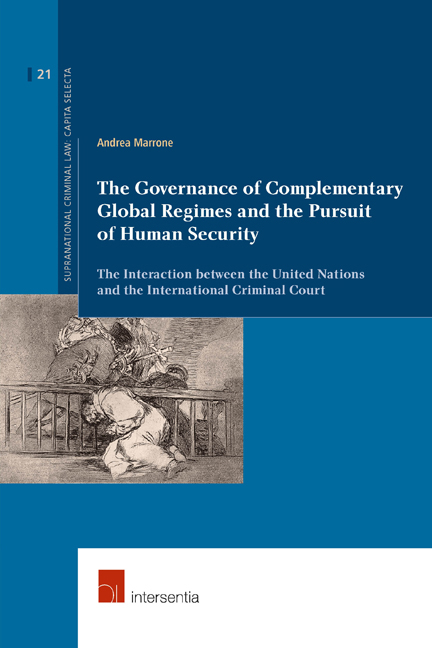
- Publisher:
- Intersentia
- Online publication date:
- December 2017
- Print publication year:
- 2016
- Online ISBN:
- 9781780685540
- Subjects:
- Law, Human Rights
- Series:
- Supranational Criminal Law

This book offers an overview of the challenges in the emerging regime of international criminal justice as a tool of sustainable peace. It illustrates the impact of the regime on international law and international relations, focusing on the obstacles to and concerns of its governance in the context of the maintenance and restoration of international peace and security. The author advocates for an appropriate interaction strategy between the United Nations and the Rome Statute institutions as a matter of international mutual concern and for the sake of human security. In multiple and inter-linked country situations the failure of strategies to prevent mass atrocity crimes have severely compromised the safety of civilians, including their individual fundamental rights. In several countries - such as in Libya, Syria, Sudan, Democratic Republic of Congo, Uganda, Kenya, Central African Republic, Ivory Coast and Mali - civilians have severely suffered the consequences of such failure. Furthermore, the right of humanitarian intervention that it is sometimes claimed the international community has is now challenged and qualified by the responsibility to protect civilians in situations of mass atrocity crimes.Such an international norm represents unfinished business in global politics and is considered by many to be far from capable of preserving the rule of international law. The preservation of the rule of law requires discussions and the advocacy of global values in international relations, such as multilateralism, collective responsibility, global solidarity and mutual accountability.About the authorAndrea Marrone's areas of expertise cover international law and international relations, law of international organisations, European policy, law and institutions, international governance and global affairs. In previous years he has addressed EU institutions to provide recommendations to the decision-making bodies on programming activities in fragile States and conflict-affected country situations, enabling development and capacity-building in the context of the EU Foreign Affairs and Security Policy.
 Loading metrics...
Loading metrics...
* Views captured on Cambridge Core between #date#. This data will be updated every 24 hours.
Usage data cannot currently be displayed.